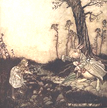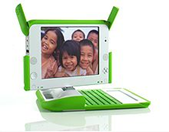 The more books in your home, the better your kids will fare in school. That’s the line in Freakonomics. And now Virginia Heffernan, the "Medium" columnist for the New York Times, is asking a related question about her son.
The more books in your home, the better your kids will fare in school. That’s the line in Freakonomics. And now Virginia Heffernan, the "Medium" columnist for the New York Times, is asking a related question about her son.
"Will Ben benefit if I load my Kindle with hundreds of books that he can’t see? Or does he need the spectacle of hard- and softcover dust magnets eliminating floor space in our small apartment to get the full ‘Freakonomics’ effect? I sadly suspect he needs the shelves and dust.
"Anyway, Ben doesn’t distinguish between my Kindle and a BlackBerry. My immersion in the Kindle is not (to him) an example of impressive role-model literacy. It’s Mom e-mailing, or texting, or for all he knows playing video games. In fact, the only time he describes what he and I do together as ‘reading’ is when we’re sitting with a clutch of pages bound between covers, open in front of us like a hymnal."
At odds with standard wisdom among moms and literacy experts
But wait. Ben is just three years old, and I wonder what would happen if the Kindle had a color screen and if Mom regularly read illustrated stories to him from the machine. Contradicting more than a few mothers and literacy experts, Freakonomics’ authors doubt that reading aloud to kids will boost their test scores. But wouldn’t this if nothing else associate the Kindle with The Joys of Reading? Meanwhile, yes, color laptops and tablets have been known to exist. The convertible OLPC machine can be both.

 I also wonder if decorating the Heffernan apartment with scenes from books—in some cases, maybe illustrations downloaded from sites like Wikipedia, my source of the image from Alice’s Adventures in Wonderland—would help get the e-versions on the minds of kids.
I also wonder if decorating the Heffernan apartment with scenes from books—in some cases, maybe illustrations downloaded from sites like Wikipedia, my source of the image from Alice’s Adventures in Wonderland—would help get the e-versions on the minds of kids.
The right books
Finally, as long as we’re comparing E and P, how about the touchy little question of how relevant the P or E books will be to the children? Shouldn’t that count, too, not just the sheer numbers of books?
Via E, parents and children can obtain a wide variety of free or low-cost books that match the kids’ interests. Shouldn’t that be a factor, too?
Not a Luddite despite the skepticism
While, as an ex-child, I’d disagree with Virginia Heffernan on various details, it’s clear she’s not a Luddite, and not just because she reads from a Kindle.
About Ben, she concludes: "As he maneuvers the computer trackpad and he shoos me away so he can study (for the 10th time) ‘Sidney Won’t Swim’ on One More Story, I’m not sure he’s developing an appreciation for books. But he is learning how to enrich his solitude, and that is one of the most intensely pleasurable aspects of literacy." Exactly. The challenge for librarians and educators, not to mention the marketers at Random House and S&S, is to make certain that books remain an enricher of that solitude—whatever form they take, P or E.
Image credit: CC-licensed photo from Ninjapoodles.


































I am a fan of reading fiction ebooks, but I think that:
First, if I gave a child a cybook to read on, it’d be broken within the hour; and
Second, a child needs (or at least will be more interested in and receive more benefit from) large colorful pictures and the tactile experience of sorting through books, turning pages, etc.
Actually it kind of scares me to think of a child never seeing a real book and only knowing books via electronic screens, although I’m not sure exactly why. It just doesn’t seem right.
Hi, Christine. Both P and E books are great for kids, and yes, the Kindle would be broken quickly–perhaps within 15 minutes. On the other hand, the OLPC machine is more rugged. Besides, the main idea is for the mother to READ to the child from the machine so he or she associates it with the joys of reading.
Thanks,
David
I think that reading is reading, and there is no biological imperative to read from paper and cardboard. I personally have some emotional attachment to paper books, and really like leather-bound books, but I suspect that this is just because I was raised with the former, and associate wealth and success with the later.
My kids are equally happy watching cable programming on the TV, or YouTube on the computer – they don’t confuse the box with the content. So I don’t think physical books are critical to literacy or a love of reading.
On the other hand, I grew up in homes with publicly displayed bookshelves, and began my own habit of reading by plucking interesting titles from my parent’s collection. I wonder how much subconscious impact I got from just walking past those shelves every day? Would I be different if my parents owned the same number of books, but kept them in boxes in the garage? Does the Kindle make reading less discoverable to a new reader? Of if a young person starts a book on the Kindle, do they feel more liberated by the built-in library?